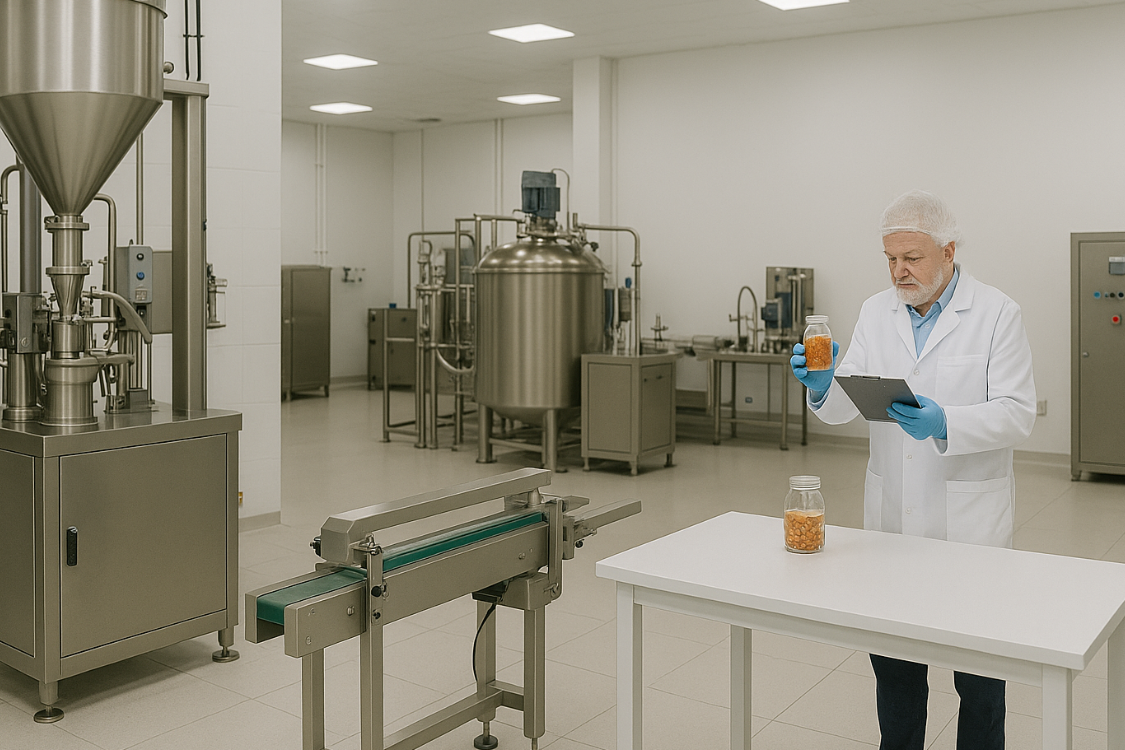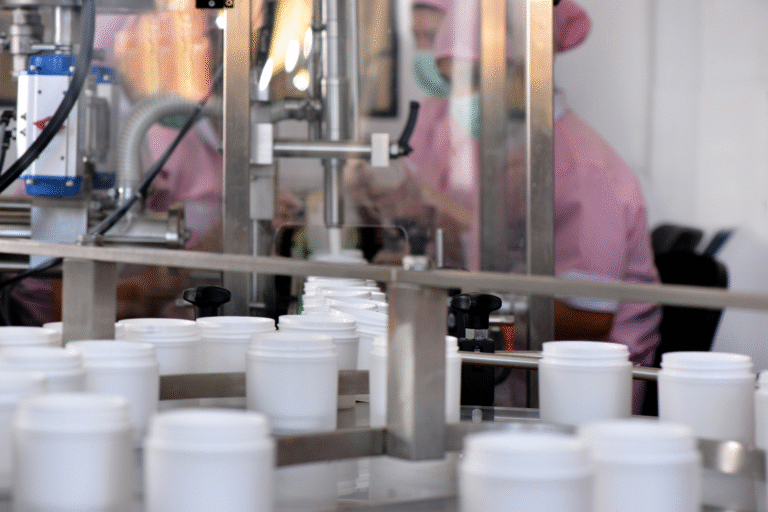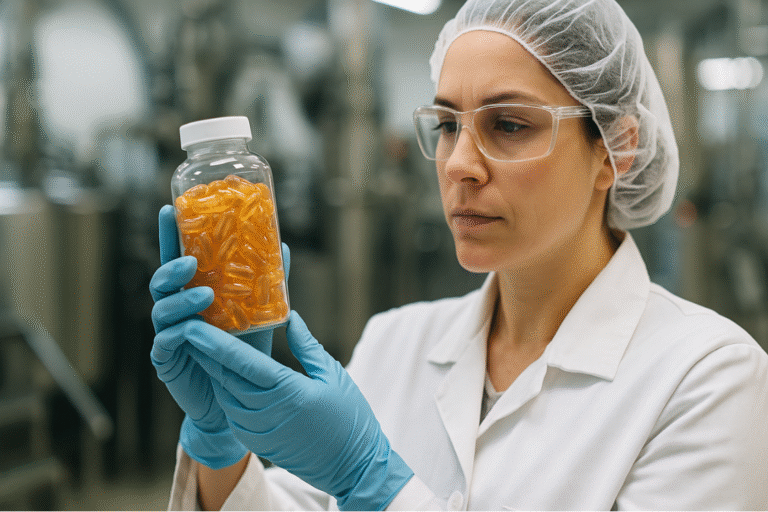When choosing a partner, supplement manufacturer operational stability is the difference between a dependable relationship and a costly risk. It directly affects the quality of your product, regulatory compliance, and your ability to meet customer demand as your business grows.
Faltering operations have severe consequences: delayed shipments, product recalls, inconsistent formulas, or, worse still, a loss of consumer confidence. These setbacks don’t just hurt one batch; they can damage your reputation and compromise growth.
This guide will show you how to evaluate a supplement manufacturer’s operational stability, the warning signs to watch for, and the steps to build a reliable long-term partnership rooted in consistency and trust.
What Is Operational Stability in Supplement Manufacturing?
Operational stability in supplement manufacturing means a company can consistently produce high-quality supplements without disruptions. It reflects how well production processes, supply chain systems, and quality control measures hold up under pressure.
A stable manufacturer is not just a producer but a dependable partner in the dietary supplement industry. Their ability to manage raw materials, packaging materials, and regulatory compliance gives your brand security and peace of mind.
Why consistency matters more than size or speed
Consistency in supplement manufacturing often matters more than production speed or company size. Stable operations lead to predictable lead times, reliable batch consistency, and reduced risk of costly recalls. For brand owners, that means less stress and a smoother path to market.
When a supplement manufacturer maintains strict adherence to good manufacturing practices, quality and safety standards are upheld every time. Consistency protects consumer confidence, extends shelf life, and ensures the finished product reflects your expectations.
How operational instability can hurt your brand
Operational instability can create risks that ripple through your entire supplement business. Late shipments disrupt sales, changes in active ingredients or formulas compromise trust, and inconsistent product quality can trigger FDA warning letters or safety alerts.
For companies in the supplement industry, instability can also mean increased costs. Extra stability testing, accelerated testing under elevated temperatures, or additional testing to confirm product safety adds to expenses. Worse, instability can erode customer trust, increase the risk of product recalls, and create uncertainty about product reliability.

What Does a Stable Supplement Manufacturer Look Like?
A stable supplement manufacturer shows clear systems, experienced people, and reliable communication. These qualities make supplement production smoother and protect your business from hidden risks.
From the outside, it’s not always easy to spot. That’s why it helps to know what specific markers point to true supplement manufacturer operational stability.
Systems and processes that run smoothly
Well-run production processes reduce the chance of compromising quality. A stable manufacturer manages ingredient sourcing, inventory management, and supply chain logistics in ways that prevent shortages or costly delays.
Their quality control systems should include finished product testing, stability studies, and written procedures that follow current good manufacturing practices. These steps ensure high-quality products, proper storage conditions, and strict adherence to regulatory requirements such as FDA regulations and the Federal Food, Drug, and Cosmetic Act.
Experienced staff and low turnover
Behind every reliable supplement production line is a skilled team. Long-term staff and consistent leadership reflect strong internal systems and a lower risk of mistakes. High turnover often signals weak training or poor workplace culture, which can affect batch consistency and supplement stability.
Stable teams also have deep experience handling dietary ingredients, running stability testing with tools like high-performance liquid chromatography or Fourier transform infrared analysis, and managing environmental concerns during production.
Reliable client communication
Strong manufacturers don’t hide behind vague updates. They offer timely delivery information, real-time supply chain reports, and easy access to decision makers.
Strict cGMP compliance has been shown to enhance consumer confidence in dietary supplement products (Crowley et al., 2006). Good communication further helps your brand plan ahead, avoid bottlenecks, and maintain consumer confidence in product consistency.

Checklist to Evaluate a Manufacturer’s Operational Stability
Here’s a quick reference when comparing dietary supplement manufacturers:
✔ Has been in business for at least 5 years
✔ Can explain their full manufacturing process clearly from raw materials to finished product
✔ Maintains consistent product lead times without compromising quality
✔ Has strong quality control systems (GMP compliance, SOPs, batch tracking)
✔ Provides real-time inventory and supply chain updates
✔ Shows low staff turnover and consistent leadership
✔ Maintains long-standing client relationships
✔ Is transparent about capacity, limitations, and regulatory compliance
Red Flags That Signal Operational Instability
Variation in product quality points to deeper issues. It may signal unstable ingredient sourcing, weak quality standards, or poor training of contract manufacturers. Inconsistent results can also trigger adverse event reporting in line with U.S. regulatory policy (Djaoudene, 2023) or attract FDA warning letters.
Frequent product delays without explanation
When manufacturers miss timelines and provide unclear answers, it may mean weak inventory management, poor supply chain controls, or leadership problems. Timely delivery should be standard in supplement manufacturing. Repeated excuses risk losing sales and consumer trust.
Inconsistent quality between batches
Variation in product quality points to deeper issues. It may signal unstable ingredient sourcing, weak quality standards, or poor training of contract manufacturers. Inconsistent results can also trigger adverse event reporting or attract FDA warning letters.
Frequent leadership or ownership changes
Shifting ownership or turnover in senior staff often leads to disorganized production processes. It disrupts written procedures, compromises quality control, and can create gaps in regulatory compliance. For brands, it translates into more risk of product recalls and costly delays.
Vague answers about processes or documentation
If a manufacturer can’t explain how the process begins, how holding dietary supplements works, or how they meet GMP compliance, it’s a clear problem. Lack of detail in stability studies, finished product testing, or adherence to industry regulations should raise concern.

How to Ask the Right Questions Before Signing a Contract
Asking clear, targeted questions helps you confirm whether a supplement manufacturer has the stability your brand needs. Look for answers backed by data, documented procedures, and client references.
Here are sample questions to ask during negotiations:
- How do you handle supply chain disruptions?
- What’s your average lead time for reorders?
- How long have your senior staff been with the company?
- What happens if a machine goes down during production?
- Can I speak to one of your long-term clients?
How to Build a Long-Term Relationship With a Stable Manufacturer
Once you find a reliable partner, building a strong relationship helps ensure ongoing quality and safety. Operational stability is easier to maintain when both sides treat the partnership with respect and accountability.
Strong supplement brands know that the right partnership goes beyond compliance with FDA regulations or the Small Entity Compliance Guide. It’s about collaboration that safeguards consumer confidence and ensures consistent product quality.
Treat it like a partnership, not a transaction
Stable manufacturers value mutual trust. Sharing expectations around regulatory requirements, safety standards, and supplement production capacity helps both sides succeed.
Keep open lines of feedback
Feedback isn’t only for problems. Regular input on ingredient sourcing, stability testing, or packaging materials helps a manufacturer improve systems without compromising quality.
Reassess performance regularly
Quarterly check-ins and performance scorecards help identify issues early. Reviewing lead times, quality control results, and regulatory compliance reduces the risk of warning letters, costly recalls, or safety alerts.

Choose Stability to Build a Stronger Supplement Brand
Evaluating a supplement manufacturer’s operational stability should be at the top of your checklist when entering the dietary supplement industry. Reliable production processes, strong quality control systems, and strict adherence to FDA regulations protect product quality, consumer confidence, and your long-term growth. A stable partner reduces the risk of product recalls, costly delays, or compromising quality. Use the key markers and red flags in this guide to compare dietary supplement manufacturers with clarity and confidence. In the end, choosing operational stability means protecting your brand, your customers, and your path to sustainable success.
Frequently Asked Questions
What is operational stability in supplement manufacturing?
Operational stability means a supplement manufacturer can consistently maintain reliable processes, strong supply chain systems, and clear communication to produce supplements that meet quality standards.
Why is operational stability important for supplement brands?
It helps prevent costly recalls, late shipments, and compromised product quality while protecting consumer confidence and regulatory compliance.
How can I tell if a supplement manufacturer is operationally stable?
Check for consistent lead times, low staff turnover, long-term client relationships, and documented quality control systems that follow good manufacturing practices.
What are the red flags of an unstable supplement manufacturer?
Warning signs include inconsistent batch quality, frequent leadership changes, vague answers about production processes, and repeated delivery delays.
Can a new supplement manufacturer still be operationally stable?
Yes, but you’ll need proof of stability testing, experienced staff, and written procedures that meet FDA regulations and industry quality standards.
References
- Crowley R, FitzGerald LH. The impact of cGMP compliance on consumer confidence in dietary supplement products. Toxicology. 2006 Apr 3;221(1):9-16. doi: 10.1016/j.tox.2006.01.011. Epub 2006 Feb 15. PMID: 16469425.
- Djaoudene O, Romano A, Bradai YD, Zebiri F, Ouchene A, Yousfi Y, Amrane-Abider M, Sahraoui-Remini Y, Madani K. A Global Overview of Dietary Supplements: Regulation, Market Trends, Usage during the COVID-19 Pandemic, and Health Effects. Nutrients. 2023 Jul 26;15(15):3320. doi: 10.3390/nu15153320. PMID: 37571258; PMCID: PMC10421343.





